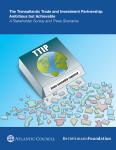As President Obama heads to Europe for the G8 summit in Northern Ireland and a state visit to Berlin, the official launch of the Transatlantic Trade and Investment Partnership (TTIP) negotiations figures prominently on the agenda. Meanwhile, in Brussels, European Union trade ministers are working feverishly to assuage the fears of certain member-states and secure a wide negotiating mandate for a comprehensive transatlantic deal.
|
Download the Atlantic Council/Bertelsmann Foundation TTIP study |
A deepened and more integrated relationship between the world’s two largest economies—the European Union and United States—offers considerable potential benefits to consumers and companies alike. By removing the remaining tariffs, clearing the way for additional international investment, and streamlining regulatory policy, goods would be cheaper and firms would be able to more effectively mobilize and invest their capital across the US and Europe. Additionally, many hundreds of thousands of jobs would be created in export sectors and in the logistics companies needed to effectively transport these traded materials.
Importantly, a reinvigorated transatlantic economy would vastly improve the international competitiveness of both regions as together they could set combined standards for the world to aspire to in environmental policy, product safety, pharmaceuticals, and any number of other industries. Exporters hoping to sell goods in either market will have just one set of rules to comply with. A combined transatlantic market representing 50 percent of global GDP would be a powerful trend-setter indeed.
According to a recent Atlantic Council-Bertelsmann Foundation study of trade experts and policymakers from the United States and Europe that I co-authored, there is widespread optimism that that the United States and EU will be able to successfully negotiate a trade and investment deal.
This is perhaps the West’s last best opportunity to set global rules, as the emerging markets continue to gain ground. Indeed, a failure to launch comprehensive negotiations—whether due to French insistence on precluding negotiations on cultural goods or a US refusal to consider convergence in financial regulation—would have significant consequences. If the transatlantic partners cannot agree among themselves, the emerging markets will have little confidence in our ability to work well globally.
While the benefits of an open transatlantic marketplace are fairly evident, there are significant hurdles that must be cleared. Traditional disputes over genetically-modified organisms in agriculture and government procurement practices are as evident as ever. Additionally, both US and European regulators will be hard-pressed to give up the powers they’ve acquired in order to develop a more predictable and transparent transatlantic rulemaking process. Thus, strong leadership on behalf of Obama and his counterparts in Brussels, Berlin, London, Paris, and elsewhere across Europe will be vital. Given the many economic benefits at stake, and the depressed economic situations facing their countries, the leaders should certainly be motivated.
As headlines from France and elsewhere in the last week have made abundantly clear, there are several challenges to trade liberalization that must be overcome. Chief among these is convincing all parties involved that the benefits of TTIP vastly outweigh the negatives. It is also important to understand that a willingness to negotiate all subjects—including quotas and state support to the television, music, and movie industries—does not necessarily mean that these quotas will be removed. Negotiators have rightly pushed for as few exemptions as possible, as red lines and exempted sectors will limit the effectiveness of the eventual deal.
The United States and Europe have discussed a transatlantic free trade area in various guises for decades. However, as negotiations for TTIP begin, this time truly seems different. Both sides recognize the need to stimulate their stagnant economies in the aftermath of the financial and Eurozone crises. Moreover, in an age of austerity, a deepened trade relationship marks a path forward that does not add to national debt levels. Lastly, the rise of the emerging markets—particularly China—which often subscribe to a different economic model focused on state-owned enterprises and government directed investment decisions, marks a historic moment and opportunity for the transatlantic community.
Standing at the precipice of negotiations, trade experts have indicated a strong backing and optimism for the initiative based on our data. The challenge will be to mobilize this sentiment into action.
Business interests, consumer groups, and civil society leaders promoting transatlantic values all have important roles to play. Politicians should keep their eyes on the bigger picture and the economic imperative to restart sustainable economic growth. A focus on the narrow differences (that make up just 2 percent of transatlantic trade by value according to the European Commission) could halt progress before negotiations even begin. That would truly be a missed opportunity neither the United States nor Europe can afford.
Garrett Workman is the associate director for the Council’s Global Business & Economics Program. This piece appeared on DHL’s Delivering Tomorrow blog.


